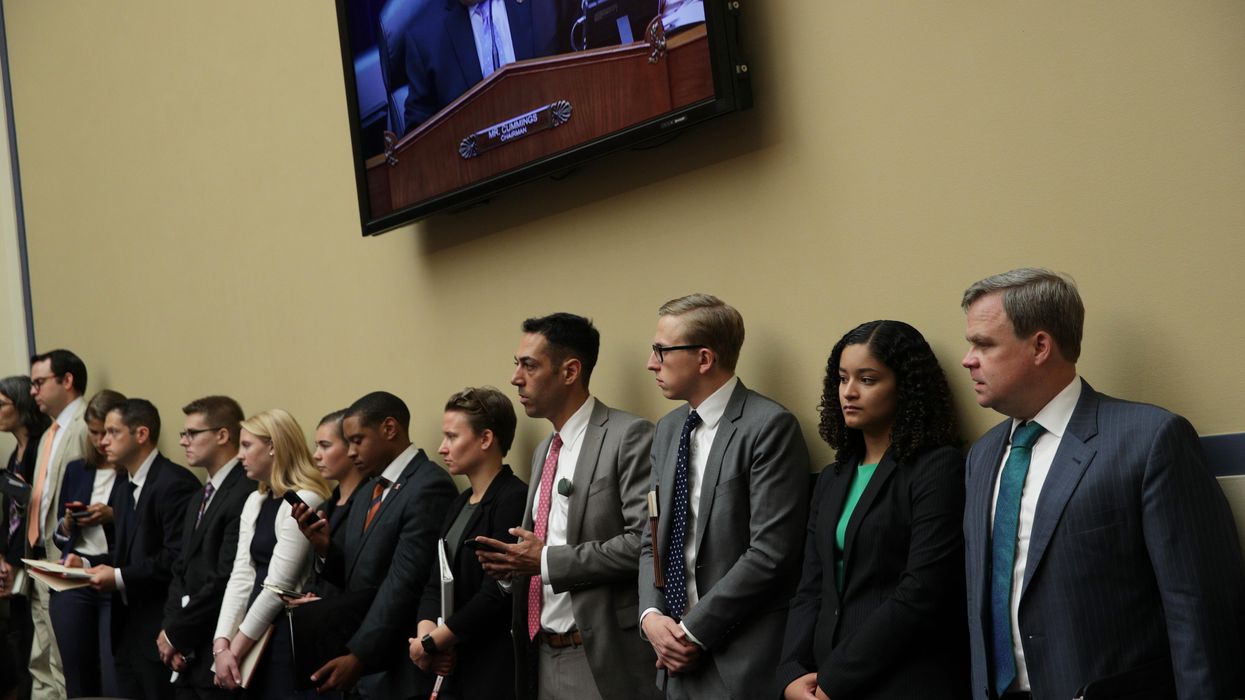Fitch is president and CEO of the Congressional Management Foundation.
At a time when many Americans lament that members of Congress representing the two major parties don't have anything in common, there is one very sad metric they share: Both Democrats and Republicans on Capitol Hill are on the receiving end of a massive increase in hostile messages and death threats.
The level of vitriol flowing through the internet and phone lines to Congress is greater than at any other time in American history. Capitol Police Inspector General Michael Bolton testified at a congressional hearing recently that the number of death threats doubled in 2021 compared to last year.
It is impossible to diminish the emotional and psychological scar this leaves with members of Congress and their families, but there is another group deeply affected that often goes unnoticed — congressional staff. Members of Congress don't answer their own phones or open emails sent to their offices — thousands of congressional staff are on the front lines of our democracy and getting the brunt of angry, racist, hurtful and dangerous speech that is polluting our nation. In a snap poll of congressional staff a few weeks ago the Congressional Management Foundation asked whether staff had recently experienced direct insults or threatening messages or communications. More than three-quarters said they had.
Perhaps one can merely cast aside concerns for staffers' welfare with a simple, "Well, that's what they signed up for when they were hired." No, not exactly. Congressional staff score amazingly high in any assessment of their level of job engagement and dedication to their profession. Staffers in Congress are not alone in their passion to help despite stressful and demanding conditions. First responders, nurses, Navy SEALS and others also make sacrifices resulting from their commitment to serve. The difference between them and congressional staff is this: most Americans who make sacrifices for others are lauded for those sacrifices, whereas congressional staff are ridiculed, belittled and literally spat upon in the public square. There comes a point where the abuse overwhelms the passion, the negativity erases all meaning of why they jumped on this crazy roller coaster called Congress to begin with.
Adding to the horror and pain is that many staffers are still working from home, and sharing phone answering duties with office colleagues. Without warning, a staffer picks up her phone to hear these chilling words: "We're coming for the congresswoman, her family, you, your family ... and we know where you live!" Before the staffer can hang up, the caller has cursed at her several times. This episode has played out countless times in the congressional community since the siege on January 6. Just think about that scene in an American home — one minute a staffer is fielding a death threat, the next moment her 6-year-old appears at her home office door asking for a peanut butter sandwich.
Leaders in Congress don't have to accept this abuse without responding. Experts in psychology and security say managers should demonstrate empathy and understanding of what staff are going through, encourage self-care and change policies to reduce the possibility that staff will be receiving "live" death threats by phone. "Leaders have to make it safe in the office for staff to express feelings and for staff to take care of themselves," said Brian Baird, a former member of Congress and clinical psychologist who has been conducting staff training sessions with CMF during the pandemic. "Building and modeling a culture of support is part of what can come out of this pandemic," he said. "We need to work on our team support and not let people fend for themselves."
CMF also strongly recommends that congressional offices temporarily stop taking live calls and move all incoming calls to voicemail. We know that some members will balk at this — however, CMF has worked with offices thathave moved to this policy and have seen no constituent push back. People are just fine getting a call back in two to four hours. These offices also report that staff are relieved from the fear of the next call. Managers: This means such a policy would result in GREATER job engagement by staff, improved morale and likely more staff retention.
For too long staff in Congress have been viewed as expendable and easily replaced. This not only has a tangible negative impact on the institution of Congress, it exacts a terrible toll on these amazing public servants. A recent news story examined the impact of the Jan. 6 insurrection and the aftermath of that attack on the mental and physical well-being of congressional staff. One staffer said: "Staff in general have been feeling like we're invisible, like nobody is looking out for us." Staff are the lifeblood of this institution, and the culture needs to change to treat them accordingly. Part of that culture of change should be to acknowledge the distressing and negative effects that this pandemic and the events of Jan. 6 are having on congressional staff, and take tangible steps to protect employees from these unbearable attacks to their mental well-being.




















Trump & Hegseth gave Mark Kelly a huge 2028 gift